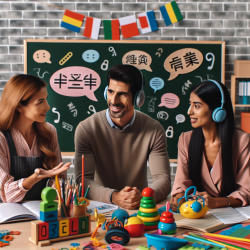Introduction
The COVID-19 pandemic has highlighted the critical role of science advice in public health policy, as demonstrated by the Canadian federal government's efforts to mobilize expertise. This case study, "Mobilization of science advice by the Canadian federal government to support the COVID-19 pandemic response," underscores the importance of evidence-informed decision-making. Speech-language pathologists (SLPs) can draw valuable lessons from this research to enhance their practice, particularly in creating better outcomes for children.
Understanding the Science Advice Ecosystem
The Canadian federal government has developed a robust science advice ecosystem to navigate public health emergencies. This ecosystem comprises various advisory bodies and mechanisms designed to procure and utilize scientific expertise efficiently. The evolution of this system during the COVID-19 pandemic offers insights into how SLPs can integrate data-driven decisions into their practice.
Implementing Data-Driven Decisions in Speech-Language Pathology
For SLPs, especially those working with children, the integration of data-driven decisions is crucial. Here are some strategies inspired by the Canadian government's approach:
- Utilize Evidence-Based Practices: Just as the government relies on evidence to inform policy, SLPs should use evidence-based practices to guide therapy decisions. This involves staying updated with the latest research and incorporating proven techniques into therapy sessions.
- Collaborate with Experts: The pandemic response highlighted the importance of collaboration among experts. SLPs can benefit from interdisciplinary collaboration, working alongside educators, psychologists, and other healthcare professionals to create comprehensive care plans for children.
- Continuous Evaluation and Adaptation: The dynamic nature of the pandemic required the government to continuously evaluate and adapt its strategies. Similarly, SLPs should regularly assess the effectiveness of their interventions and be willing to adjust their approaches based on data and feedback.
Encouraging Further Research
The research paper identifies areas for further inquiry, such as assessing the independence of science advisory actors. SLPs can take inspiration from this by engaging in research to explore new methodologies and interventions that could improve child outcomes. By contributing to the body of knowledge, SLPs can help shape future practices and policies.
Conclusion
The Canadian government's mobilization of science advice during the COVID-19 pandemic provides a valuable framework for SLPs aiming to improve child outcomes. By adopting evidence-based practices, collaborating with experts, and engaging in continuous evaluation, SLPs can enhance their practice and contribute to the well-being of children. For those interested in delving deeper into the original research, please follow this link: Mobilization of science advice by the Canadian federal government to support the COVID-19 pandemic response.










